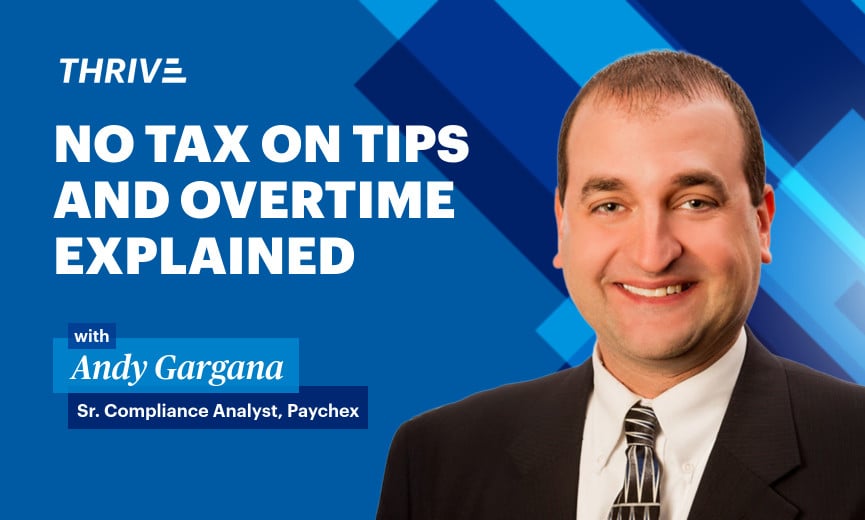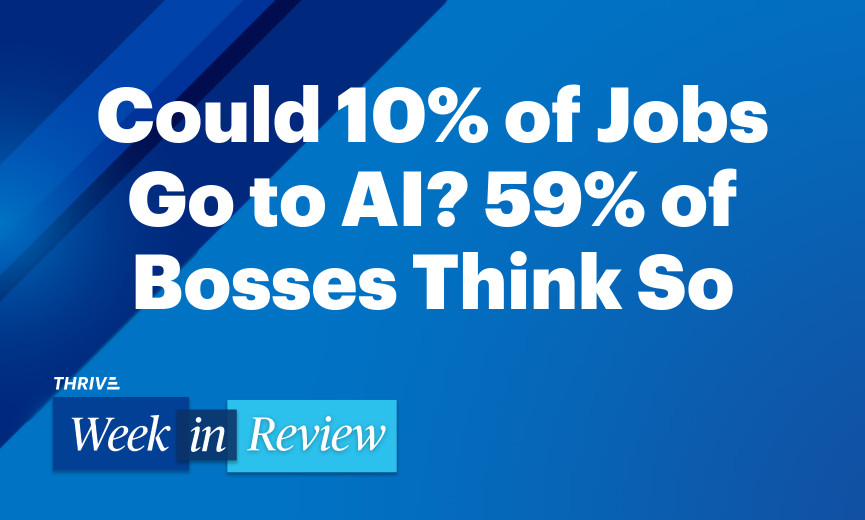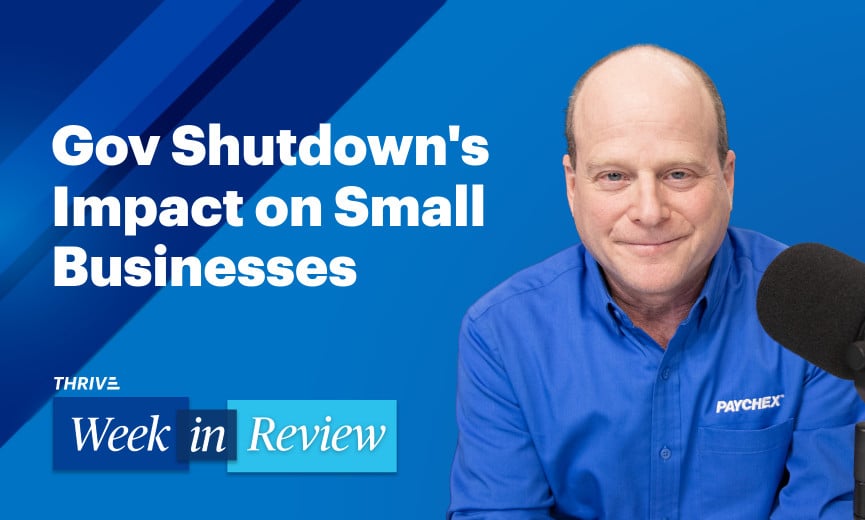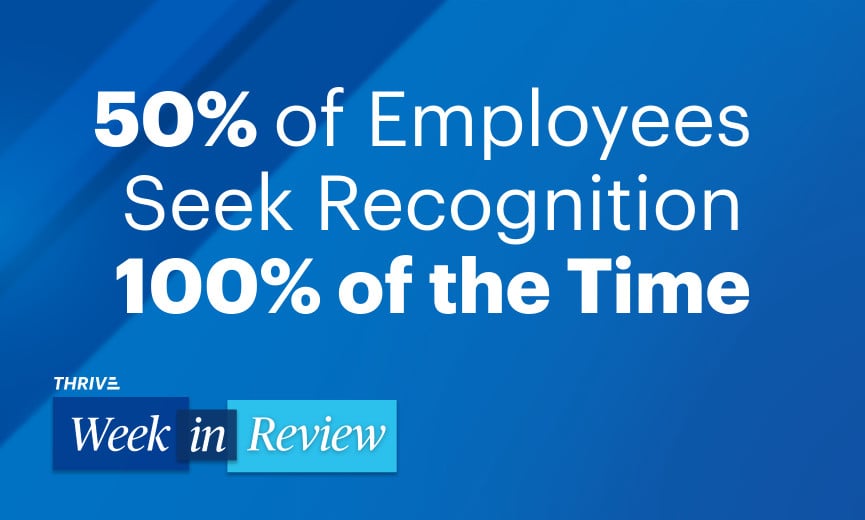- Thrive
-
Season
4Episode186
Fed Cuts Interest Rate, Businesses Need Proper Insurance, Labor Tops Inflation Among Concerns
Podcast •
Watch
Summary
With a recent cut in the interest rate by the Federal Reserve, Gene Marks comments about what this could mean for businesses. As it stands, Gene says more cuts are needed to spur the economy and loosen up banks to lend at better rates. This week’s episode also looks at the insurance issues businesses have, including the 30% that don’t carry any type of protection, while Gene offers tips on how to offset this gap. And even though businesses struggle with higher prices in this period of inflation, it is actually labor woes that take the top spot among business concerns.
View Transcript
Hey everybody, this is Gene Marks, and welcome to this week's episode of the Paychex THRIVE podcast. Thank you so much for joining me. This is the podcast where we take 2 or 3 items from the news that happened over this past week, and we talk about them a little bit and how they impact your small business and mine. So, let's get to the news, right?
The first bit of news is from the Federal Reserve. Interest rates are coming down. The Federal Reserve cut its federal funds rate by 50 basis points. That's half a percentage point. And what does that mean? Well, first of all, the federal funds rate is the rate that the Fed loans money to its banks and what it charges banks when they access cash from the Federal Reserve. The idea is that if they reduce the interest rate, that means that more banks will have a lower cost of loaning money out, which is more attractive to businesses and individuals to get loans. And as loans come into the economy, it finances capital and acquisitions and purchases and therefore is a good thing for the economy. So that's great.
The question is how will this interest rate reduction impact your business and my business, as well? And I don't want to disappoint you guys, but not that much. I mean, right now, the overall bank's prime rate up until this adjustment has been, it's about 8.5%. So, with this new rate reduction, your bank prime rate is going to go down to 8%.
Now, if you're paying the prime rate at your bank, good for you – a lot better than most of my clients and me. Most of us, as business owners, are paying two three points above prime. We're paying 10% right now, or 11% for equipment loans and working capital loans and property loans and things like that.
So, if we see the rate go down by five percentage points, instead of saying, you know, paying 10.5%, maybe we're paying 10%. Or if we're not paying 11%, we’re paying 10.5%. It's not a big difference. In fact, I did the math. For a typical small business, and a 10% interest rate that's borrowing money – $1 million for, you know, equipment, for example – they're going to see their interest costs go down by about $14,000 over five years. It's hundreds of dollars a month.
So, it's good. I'm not saying this is not a bad thing. Obviously. It's certainly a step in the right direction. But, you know, as banks are making determination as to credit worthiness and the availability of capital, the cost of capital is still high and a lot of, you know, studies have shown from the Federal Reserve that banks are constricting capital use, you know, availability to small businesses, because their ability to pay it back has become more and more uncertain because of higher interest rates.
This half a point, you know, a half a percentage point reduction in interest rates, I don't think it's going to change that dynamic very much, at least not in the short term.
What we want to look for is more interest rate reductions, and the Fed has promised them. Now, if interest rates come down to, you know, our primary comes down to 7%, 6%, now we're cooking because now we're at a prime rate where, okay, our interest rates are maybe 7, 8, 9%, which is something a lot less than what we're paying right now. We can make projects and loans that much more affordable, justify them that much better. And by doing that, make availability, of more capital for small businesses.
So, short term, I'm not expecting to see a whole lot of changes in the banking environment, the availability of credit, your ability to get new loans from traditional banks just because the Fed reduced interest rates. But I do think that it will have an impact.
Now, the other thing, I also want to mention is mortgage rates. A reduction in this interest rate is going to bring down mortgage rates. In fact, most mortgage rates are already taking this into account. Still, a typical mortgage rate in the country right now is about 6%, which is twice what a lot of people were paying in mortgage when they bought homes just a few years ago.
So, we still have a ways to go before it makes a difference. So, do I think that this rate cut is going to spur something in the residential real estate market? I'm not so sure it's going to have that big an impact, but again, it will have some impact. The more rate cuts we have and the more mortgage rates come down, the more residential activity will see.
And let me tell you, I only bring it up because so many businesses rely on residential real estate. It is a huge, massive market that impacts not only direct small businesses like real estate brokers and advisors and real estate firms that are involved, but also, construction companies and lawyers and accountants and, you know, title insurance companies, and contractors, and hardware stores and people that do home renovations, as well. All those people are impacted by the residential real estate industry. So, the more activity we see in that industry, the better overall it is for small businesses and for the economy.
So, will that half a point, that half a percentage point reduction, you know, create that activity? Again, I don't really know if I'm going to see a lot of that. But again, it is a step in the right direction. So, bottom line is: Fed has reduced interest rates. It's good news. Hopefully, we'll continue to see more before we see it having a significant impact on our businesses.
Let me move to the next piece of news to report to you. This comes from a survey that was done by a company called Next Insurance, and they surveyed small business owners around the country. And let me read out to you some of the results because it's quite interesting and impacts all of us.
They say that 90% of small business owners aren't confident that they are adequately insured, according to this survey. In addition, some of the numbers just to share with you, right: 30% don't carry any small business insurance at all – 30%. Now, they only interviewed 500 small business owners. These are business owners with less than 50 employees, and a third of them don't have any insurance. You know, these are these are big issues.
In addition to that, a large percentage of small business owners, you know, besides not having enough coverage, also aren't really sure they understand what's needed from their insurance ability, you know, the decisions that they need to make. Fifty-three (53) percent of them said their greatest barrier to getting insurance coverage is simply knowing what kind of insurance package their business needs.
So, let me tell you, sometimes, you can't run a business without having business insurance. I mean, the fact that 30% of businesses don't have it is just blows my mind. You have to have insurance for your business.
Now, I also understand that it's complicated. There's a lot of options. I mean, there's package policies, there's property insurance, there's liability insurance, workers’ comp, cyber insurance. I get it, it's confusing. Don't buy your insurance just online. This is my advice, you know, I mean, work with a good insurance broker, a good insurance agent. A good agent will represent you and give you good advice. They'll tell you and explain to you the different options that you have and make recommendations for you.
And don't be afraid to go back out into the market every year and rebuild on your insurance policies. It happens all the time. Problem is, we become lazy. You know, we get insurance, and we just renew it every year without really looking into it. And by the way, we do that ourselves. You know, personally, I mean, when was the last time you, you really looked at and compared rates for your auto insurance or your property or your home insurance? I mean, probably not for a while. I know I haven't, I'm lazy. And, you know, we're paying more than what we need to be paying. So, it is something that should be done on an annual basis.
Insurance is important. Make sure that your business has it. Don't do it on your own. It's a complicated topic. Go and get some advice from a good insurance broker and work with somebody that has experience in the industry.
The final bit of news to report to you this week is another survey. This comes from the AICPA, the American Institute of Certified Public Accountants. For most of the year, business executives have consistently named inflation as their top economic concern, but that concern is quickly becoming replaced.
First of all, the economy, a lot of business owners are not confident about the economy. Only 26% of them said they were optimistic about the economy's prospects over the next 12 months. That's down from 35% just a year ago. It's volatile. It's being out there. Fifty-seven (57) percent of business executives said they were still worried about inflation over the next six months, but that's a significant decrease from the 75% who said that last quarter. Inflation dropped to number two on the list of top concerns.
Can you figure out what the number one concern is of business owners and managers and executives? It's labor. It's finding good people and retaining good people. We're back to that. I mean, even though the job market has been softening a bit over the past few months, most businesses are still looking for good people, and we're grappling with higher costs of compensation and higher costs of benefits. I mean, health insurance rates are projected to go up 9% again next year. So, that has now replaced the biggest concern.
So, if you're running a business and you're like inflation has been an issue, but it's not my biggest issue right now. It's finding good people. You're going to be in sync with a lot of the people that responded to this. AICPA survey. Also, if you're not feeling as confident about the economy in the next 12 months, you'll also be in sync with a lot of this survey respondents, as well.
My name is Gene Marks. You have been watching and or listening to the Paychex THRIVE Week in Review. If you need any help or advice or tips and running your business, sign up for our Paychex THRIVE newsletter. Go to paychex.com/thrive.
In the meantime, thank you so much for watching or listening. We'll see you again next week. Take care.
This podcast is property of Paychex, Incorporated 2024. All rights reserved.

 Apple Podcast
Apple Podcast Spotify
Spotify iHeartRadio
iHeartRadio









